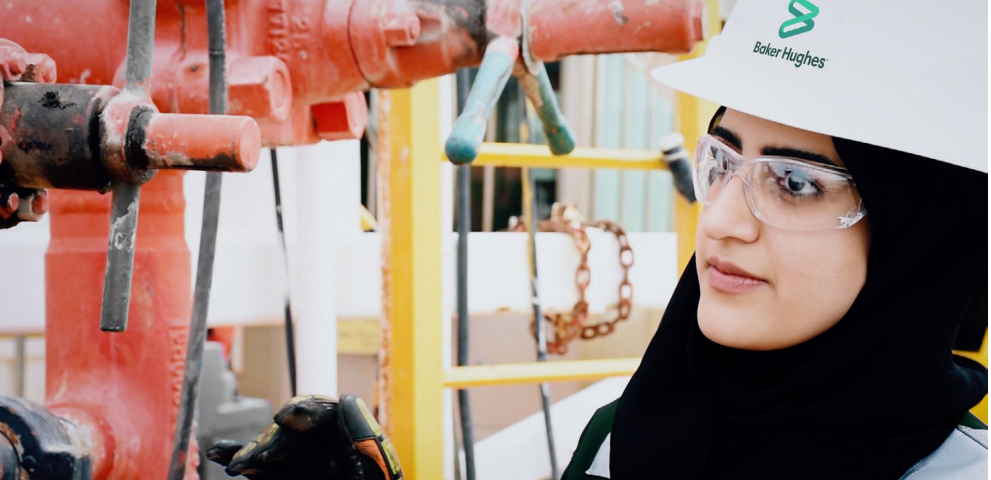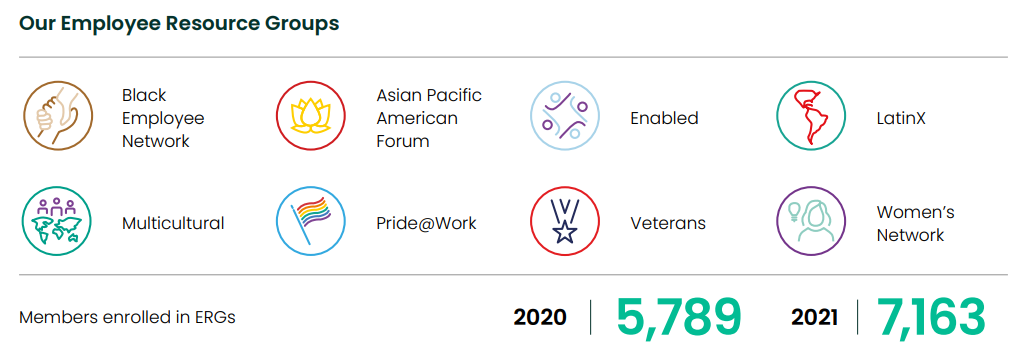2021 Baker Hughes Progress in Diversity, Equity and Inclusion
2021 Corporate Responsibility Report
Energy Forward | 2021 Corporate Responsibility Report
As we shape the future of the energy industry, we believe unique ideas and perspectives fuel innovation and our differences make us stronger. We value differences in gender, race, ethnicity, age, gender identity, sexual orientation, ability, cultural background, religion, veteran status, experience, and perspective across the globe. We believe that everyone has the right to be treated with fairness, dignity, and respect so that all employees can feel safe to be their authentic selves. We take a strong stance against discrimination in any form and provide avenues for employees to report and address concerns without fear of retaliation. In addition, we continue to focus on attracting, retaining, and advancing diverse talent worldwide.
Accountability for DEI progress begins at the executive level, where each member of the Executive Leadership Team (ELT) develops and executes an annual DEI plan that is specific to the opportunities in their respective area of responsibility. The Chief DEI Officer meets with each leader semi-annually to review their plan and progress. Our executive-level Global Diversity, Equity and Inclusion Council meets quarterly to track progress against our goals, and to identify new opportunities to create a more inclusive and diverse culture. DEI progress is reviewed by the Human Capital and Compensation Committee of the Board of Directors.
We advanced our DEI programs and culture in 2021 in multiple ways. First we established a common framework and definitions, defining four strategic focus areas: diverse workforce, inclusive culture, supplier diversity, and engaging with customers and communities. Then we implemented new processes and tools to manage this important priority.
To help teams across the organization measure their progress, we introduced a new DEI Dashboard with common metrics for representation, hiring, promotions, attrition, gender, race/ethnicity, disability, and veteran status. We also established a DEI Community of Practice, which provides a forum for leaders and HR professionals to collaborate, share best practices, and learn from one another.
Diverse workforce
To attract and retain a diverse workforce, we must ensure that Baker Hughes maintains access to and supports a diverse pipeline of talent.
We are managing our DEI priorities by improving our data collection and enhancing our reporting. Beginning with our US-based employees, we invited people to update their demographic information in the HR portal. This voluntary self-identification on gender, race/ ethnicity, veteran status, disability status, and sexual orientation helps to better inform and position support of an equitable work environment for all employees at Baker Hughes. For example, this information informs which benefits, programs, and resources can best support our employees. We plan to expand voluntary self-identification to other countries in 2022, subject to local regulation.
Our overall workforce demographic data is provided in this table, and we publish a summary of our EEO-1 report on our Company’s website.
| Women at Baker Hughes | |||
| 2019 | 2020 | 2021 | |
| Board of Directors | 22% | 33% | 33% |
| Senior leadership | 21% | 17% | 18% |
| All employees | 17% | 18% | 19% |
| Women in STEM roles* | 11% | ||
|
People of color in US who identify |
25% | ||
| Age Diversity at Baker Hughes | |||
| 2019 | 2020 | 2021 | |
| Under 30* | 10.2% | ||
| 30-50* | 70.4% | ||
| Over 50* | 19.4% | ||
*New 2021 metric
In 2021, the percentage of people who identify as women in our workforce, in senior leadership positions, and on our Board of Directors was 19%, 18%, and 33%, respectively. Specific to the US, 36% of Baker Hughes employees identify as people of color.
Globally, our most visible diversity opportunity is increasing representation of women in our workforce and leadership, while an additional focus in the US is increasing minority representation. In 2021, we did not see significant shifts in the percentage of those who identify within these categories. While this was partly a function of limited hiring across the organization, we recognize that we have much more to do. We also began to collect and report on age diversity for the first time, as well as women in STEM roles and people of color in the US who identify as women.
During the year, we continued to advance projects to improve our DEI performance. For example, we have enacted a number of talent acquisition initiatives, such as launching pilot projects on blind resumes and debiasing job descriptions, interview templates, and assessments. We also expanded our talent acquisition focus to include executive search services with strong track records in locating diverse candidates.
Inclusive culture
Our Global DEI Council was established in 2021 to increase accountability on this strategic priority. Our DEI Community of Practice facilitates sharing best practices across the enterprise. We reinforce our inclusive culture with tools, resources, and learning opportunities that raise awareness, foster inclusive behaviors, and build cross-cultural competencies.
Our DEI Community of Practice facilitates sharing best practices across the enterprise. We reinforce our inclusive culture with tools, resources, and learning opportunities that raise awareness, foster inclusive behaviors, and build cross-cultural competencies.
Through a collaborative partnership with the Baker Hughes Global Learning team, the DEI Community of Practice designed learning paths for leaders, employees, and our HR community on topics ranging from basic DEI fundamentals to training on unconscious bias.
Our inclusive culture is further reinforced by our Employee Resource Groups (ERGs), groups of employees who have joined together based on shared interests, characteristics, or life experiences. These groups can have a powerful influence on driving change by elevating the conversation and awareness around key issues and engaging with the communities where we operate. All employees are welcome to join ERGs either as members of represented communities or as allies. In 2021, total ERG membership increased by 24%. This effort has enhanced our DEI focus and fostered closer connections between employees in communities around the world.
The ERGs provide learning and development opportunities, professional mentoring and networking, a sense of community, and opportunities for volunteer service.
Some examples of the projects led by our ERGs during 2021 include:
- International Women’s Day Choose to Challenge social media campaign
- Annual Juneteenth celebration
- A panel discussion on The Role of Unconscious Bias in a Multicultural Workplace
- An International Day of Persons with Disabilities event with comedian, disability advocate, and bestselling author Maysoon Zayid
- A virtual cruise across Latin America
- A Men’s Health Awareness Month campaign
- A global Pride celebration and the Company’s second annual Virtual Pride Parade
- STEM coaching sessions for children
- Marine Toys for Tots holiday gift drive
Underlying these initiatives and development opportunities is a firm commitment to strive for a workplace free from discrimination. This basic human right is clearly outlined in our Code of Conduct and is communicated to all employees annually as a condition of employment. We prohibit discrimination or harassment against any employee or applicant based on race, color, religion, national or ethnic origin, sex (including pregnancy), sexual orientation, gender identity or expression, age, disability, veteran status, or other characteristics protected by law (see our Fair Employment Practices Statement).
We are committed to providing a work environment free from all forms of harassment and bullying, including sexual harassment, and furthering workplace health and safety. Our holistic program for managing human rights, labor rights, and nondiscrimination is detailed in the Principles section of this report.



